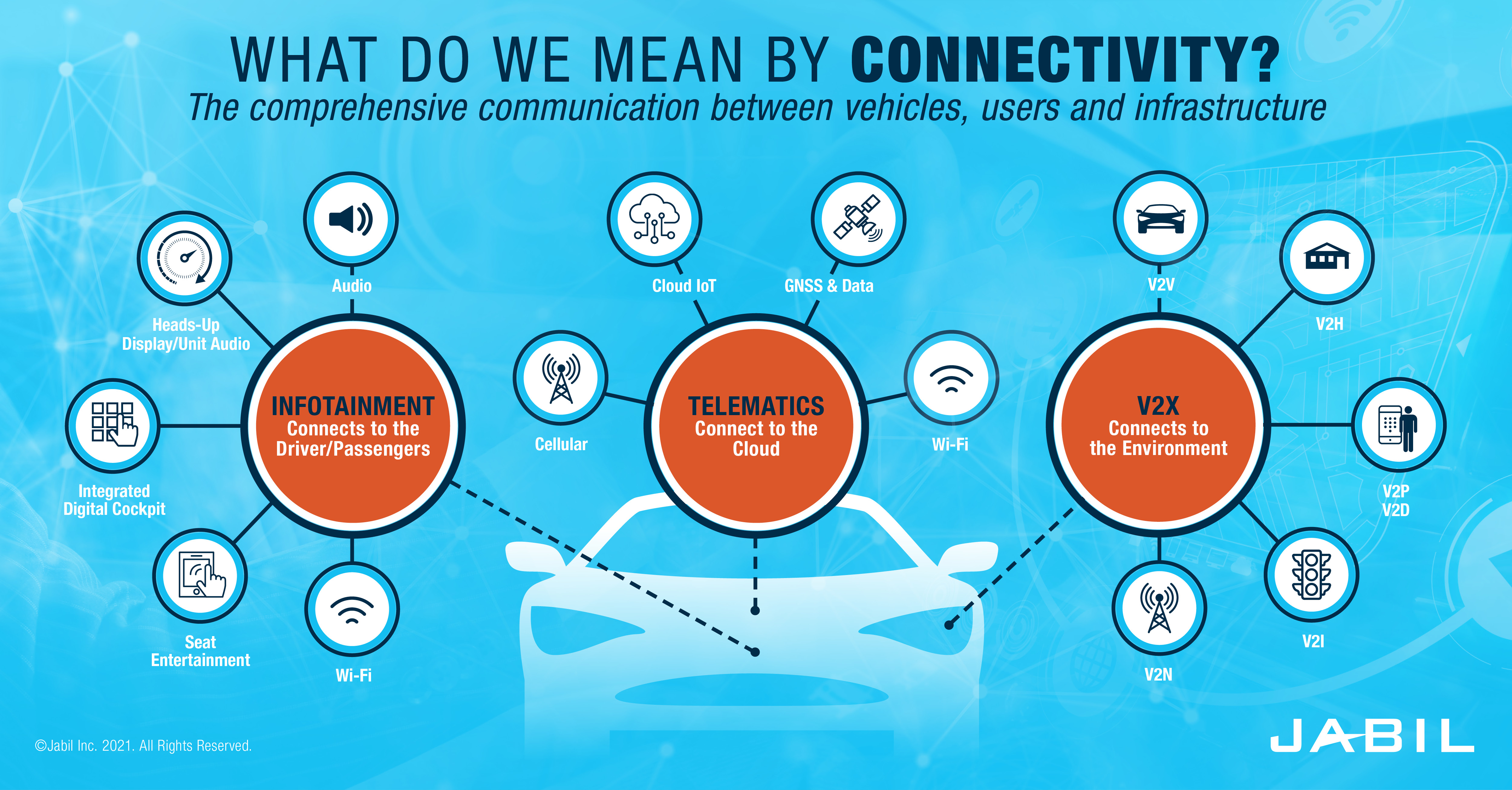Intro-
Discover the transformative power of car connectivity features that make vehicles more than just transportation. Seamlessly integrate your smartphone, access entertainment, and stay safe with collision warnings and emergency assistance. Experience the intelligent technologies that enhance your driving with confidence. Welcome to the world where technology meets the open road!

Source: jabil.com
Car Connectivity Features: Enhancing Driving Experiences
Car connectivity features have revolutionized the way we interact with our vehicles. With advancements in technology, cars are no longer simply modes of transportation. They have become smart, connected devices that offer a wide array of features and services to enhance our driving experiences. From seamless smartphone integration to real-time navigation and safety alerts, these features have become integral to modern-day automobiles. In this article, we will explore the various aspects of car connectivity features and how they are transforming the way we drive.
1. Smartphone Integration: Staying Connected on the Go
Simplifying Communication:
The integration of smartphones with car connectivity systems has made it easier than ever to stay connected while on the go. By syncing your smartphone with your car’s system, you can make and receive calls, send and receive text messages. You can even access your favorite music streaming apps – all without taking your hands off the steering wheel. This ensures a safer driving experience by minimizing distractions. It also allows you to stay connected and handle important calls or messages on the road.
Enhancing Navigation:
Gone are the days of fumbling with paper maps or relying solely on standalone navigation devices. Car connectivity features now offer seamless integration with popular navigation apps such as Google Maps or Apple Maps. With real-time updates and turn-by-turn directions displayed directly on your car’s infotainment screen, you can navigate unfamiliar routes with ease. Additionally, these systems often provide live traffic updates, suggesting alternate routes to help you avoid congestion and reach your destination faster.
Entertainment Onboard:
Long drives or traffic-heavy commutes can be boring, but car connectivity features have transformed the in-car entertainment experience. By connecting your smartphone to the car’s infotainment system, you can enjoy your favorite music, podcasts, or audiobooks through the car’s speakers. Some systems even support video playback, allowing passengers to enjoy movies or TV shows on the go. With the ability to control playback and browse content through voice commands or touchscreen interfaces, your car becomes an entertainment hub on wheels.
2. Safety and Security: Peace of Mind on Every Drive
Emergency Assistance:
Car connectivity features include advanced safety systems that provide peace of mind to drivers and their loved ones. In the event of an accident or emergency, many modern cars are equipped with automatic crash notification systems. These systems use built-in sensors to detect collisions and immediately send out distress signals to local emergency services. This ensures that help arrives quickly. Additionally, some cars have features like roadside assistance buttons or voice commands. This can connect you directly to emergency services or designated contacts.
Real-Time Alerts:
Keeping road safety paramount, car connectivity features also provide real-time alerts for potential dangers on the road. These alerts can include notifications for nearby accidents, road closures, or hazardous weather conditions. By receiving these alerts directly on your car’s display, you can make informed decisions about route changes. You can also adjust your driving behavior to ensure maximum safety. Some advanced systems even offer predictive analytics. It alerts you to potential driver fatigue or drowsiness, helping you avoid accidents caused by inattentiveness.
Theft Prevention:
Car connectivity features play a crucial role in preventing vehicle theft. With GPS tracking capabilities, you can keep an eye on the location of your car at all times. Many systems also offer remote locking and unlocking, so you can secure your vehicle even when you’re not physically present. In case of theft, these features aid the authorities in tracking down and recovering your vehicle efficiently. The peace of mind that comes with knowing your car is protected adds another layer of convenience to the overall driving experience.
3. Vehicle Maintenance and Efficiency: Optimizing Performance
Maintenance Reminders:
Car connectivity systems incorporate intelligent diagnostics that monitor the health of your vehicle. They can track parameters such as oil life, tire pressure, and overall engine performance. By analyzing this data, the system can detect potential issues or schedule routine maintenance reminders, ensuring your vehicle remains in top condition. This proactive approach to maintenance helps prevent breakdowns and contributes to the longevity of your car.
Eco-Friendly Driving:
Many car connectivity features also focus on improving fuel efficiency and promoting eco-friendly driving habits. These systems encourage drivers to adopt greener practices. They provide real-time feedback on driving behavior to offering suggestions on optimizing fuel consumption.
Some advanced systems even map out the most fuel-efficient routes for your trips. They identify charging stations for electric vehicles or suggesting alternative modes of transportation to reduce carbon footprints.
Remote Control and Convenience:
Car connectivity features allow for remote control of certain vehicle functions, adding convenience to your daily life. For example, you can use your smartphone or smartwatch to start or stop the engine, adjust the climate control settings, or lock/unlock the doors. These capabilities are particularly useful during extreme weather conditions, allowing you to warm up your car or cool it down before getting in. Remote control features also extend to amenities such as seat adjustment or opening/closing the trunk. This makes your driving experience more comfortable and hassle-free.
The Future of Car Connectivity
As technology continues to advance at a rapid pace, the possibilities for car connectivity features are expanding. With the advent of 5G networks and the Internet of Things (IoT), cars will become even smarter and more interconnected. Features such as integrated virtual assistants, augmented reality displays, and biometric authentication are likely to become commonplace in future vehicles. The integration of car connectivity with smart city infrastructures will further enhance the driving experience, offering features like intelligent traffic management and seamless integration with public transportation. The future of car connectivity is bound to transform our roads into smarter, safer, and more efficient spaces.
The Importance of Connected Cars: Shaping the Future of Mobility
Connected cars are not just a novelty; they play a vital role in shaping the future of mobility. These technologically advanced vehicles are paving the way for autonomous driving, electric mobility, and sustainable transportation. By utilizing the power of connectivity, cars are becoming safer, more efficient, and more enjoyable to drive. From improved safety features to personalized driving experiences, connected cars bring a host of benefits that are revolutionizing the automotive industry. Let’s explore the various aspects of connected cars and understand their significance in shaping the future of mobility.
1. Enhanced Safety and Security Features
Advanced Driver Assistance Systems (ADAS):
Connected cars are equipped with advanced driver assistance systems that enhance safety on the roads. These systems use sensors, cameras, and connectivity to monitor the environment around the vehicle and provide real-time warnings or interventions to prevent accidents. Features like automatic emergency braking, lane departure warning, and adaptive cruise control help drivers avoid collisions and maintain safe driving practices. Connected cars also have the ability to share information with other vehicles, creating a network that enhances overall safety for everyone on the road.
Remote Vehicle Monitoring:
Connected cars allow owners to remotely monitor their vehicles’ status and receive notifications about potential issues or maintenance requirements. Through smartphone apps or web portals, car owners can access real-time data about fuel levels, battery status, tire pressure, and more. This information helps drivers stay proactive about servicing their vehicles, ensuring optimal performance and reducing the chance of unexpected breakdowns. Remote monitoring also enables stolen vehicle recovery, as the vehicle’s location can be tracked and shared with law enforcement.
Cybersecurity Measures:
As vehicles become more connected, the risk of cyberattacks increases. Automotive manufacturers and technology companies are investing in robust cybersecurity measures to protect connected cars from breaches. Encryption, secure communication protocols, and regular software updates are some of the methods employed to safeguard the integrity of vehicle data and prevent unauthorized access. By prioritizing cybersecurity, connected cars can provide a safe and secure driving experience for users.
2. Improved Efficiency and Sustainability
Optimized Traffic Management:
Connected cars play a crucial role in optimizing traffic management and reducing congestion on the roads. By gathering real-time data about traffic conditions, connected cars can provide drivers with alternative routes to avoid heavy traffic areas. Additionally, data collected from connected cars can be used by traffic management authorities to make informed decisions about road design, traffic signal timings, and infrastructure improvements. This integration between vehicles and smart city systems leads to more efficient transportation networks and reduces fuel consumption and emissions caused by idling in traffic.
Electric Vehicle Integration:
Connected cars are driving the adoption of electric vehicles (EVs) by addressing concerns about charging infrastructure. With connectivity capabilities, EVs can provide real-time data about nearby charging stations, their availability, and other relevant information. This information helps EV drivers plan their journeys more effectively, eliminating range anxiety and making electric mobility a viable option for everyday use. Connected cars can also optimize charging schedules based on electricity price fluctuations, promoting the use of renewable energy sources and minimizing the strain on the power grid.
Personalized Driving Experiences:
Connected cars have the ability to personalize the driving experience based on individual preferences and behavior. By analyzing data about a driver’s habits, connected cars can adjust settings such as seat position, climate control, and audio preferences automatically. This level of personalization enhances comfort and convenience, making the driving experience more enjoyable. Connected cars can also integrate with other smart devices and services, such as syncing with personal digital assistants or integrating with home automation systems, creating a seamless transition between the car and the driver’s lifestyle.
Embracing the Future of Connected Cars
Connected cars are undoubtedly the way forward in the automotive industry, bringing forth a new era of driving experiences. As technology continues to evolve, we can expect even more advanced connectivity features in our vehicles. From immersive infotainment systems to seamless integration with the Internet of Things, the possibilities are vast. It is crucial for automotive manufacturers, technology companies, and regulators to work together. This is to ensure the security, safety, and smooth integration of connected cars into our daily lives. By embracing the future of connected cars, we can unlock a world of possibilities. This can help us shape a more efficient, sustainable, and enjoyable future of mobility.
Key Takeaways: Car Connectivity Features
- Car connectivity features allow you to integrate your smartphone with your car’s infotainment system.
- With these features, you can make hands-free calls, send text messages, and access your favorite apps while driving.
- Some cars offer Wi-Fi hotspots, allowing you to connect your devices to the internet on the go.
- Car connectivity features also include GPS navigation systems, helping you find your way to your destination.
- These features enhance convenience, entertainment, and safety, making your driving experience more enjoyable.
Frequently Asked Questions
Welcome to our frequently asked questions section on car connectivity features. Find answers to common queries about the latest connectivity technologies in modern vehicles.
1. How do car connectivity features enhance the driving experience?
Car connectivity features enhance the driving experience by providing seamless integration between your vehicle and your smartphone or other devices. These features allow you to access navigation services, stream music, make hands-free calls, and send messages, all without taking your hands off the wheel or your eyes off the road.
Additionally, car connectivity features often include real-time traffic updates, weather information, and emergency assistance services, making your drives safer and more efficient. With these advanced technologies, you can enjoy a connected and convenient driving experience.
2. Is car connectivity limited to new car models only?
No, car connectivity is not limited to new car models only. Although newer vehicles often come with more advanced connectivity features, you can also find aftermarket solutions to upgrade older vehicles. Various manufacturers offer retrofit kits, adapters, and accessories that add connectivity features to older cars, allowing you to enjoy the benefits of connected driving.
Additionally, smartphone apps and devices like Bluetooth adapters can provide some level of connectivity to older vehicles. So, even if your car isn’t equipped with built-in connectivity, there are options available to enhance your driving experience.
3. Can car connectivity features be customized?
Yes, many car connectivity features can be customized to suit your preferences and needs. For example, you can often personalize the user interface of your vehicle’s infotainment system to arrange and prioritize your favorite apps and functions. Some systems even allow you to create multiple user profiles, so each driver can have their personalized settings.
Furthermore, voice recognition systems integrated into car connectivity features can often be trained to understand your voice commands better. You can customize the system by teaching it how you pronounce certain words or phrases, making it more accurate and responsive to your voice.
4. Are car connectivity features safe to use while driving?
Car connectivity features are designed with safety in mind and often incorporate technologies to minimize distractions. By utilizing voice commands and touch controls on the steering wheel or dashboard, you can interact with the features without taking your eyes off the road or hands off the wheel. This helps to keep you focused on driving while still being able to access necessary information and functions.
However, it’s important to use these features responsibly and understand their limitations. Avoid performing complex tasks or excessive device interactions while driving, as it can still lead to distractions. Remember, safety should always be the top priority when using car connectivity features.
5. Can car connectivity features be used outside of the vehicle?
Yes, car connectivity features can often be used outside of the vehicle as well. Many vehicle manufacturers offer companion apps that allow you to remotely control certain functions of your car, such as locking/unlocking doors, starting the engine, and checking vehicle status. These apps enable you to conveniently manage your car from your smartphone, even when you’re not inside the vehicle.
Additionally, car connectivity features can extend beyond the car itself and integrate with other smart devices. For example, you may be able to control your smart home devices or access your favorite music streaming platform through your vehicle’s infotainment system. This seamless integration enhances the overall connected experience even when you’re not behind the wheel.

Source:
Summary
Car connectivity features can make our driving experience safer and more convenient. Features like Bluetooth, voice recognition, and GPS navigation allow us to stay connected while keeping our hands on the wheel and our eyes on the road. With these features, we can make phone calls, send messages, and even get directions without having to fumble with our phones. However, it’s important to remember that using these features responsibly is crucial for our safety. We should always prioritize the task of driving and only use these features when it is safe to do so.
Additionally, car connectivity features may come with potential drawbacks. They can be distracting if used improperly, so it’s essential to limit our usage and avoid multitasking behind the wheel. It’s also important to keep our devices up to date and secure to prevent any potential cybersecurity risks. Despite these challenges, when used responsibly, car connectivity features can greatly enhance our driving experience and help us stay connected on the road.
